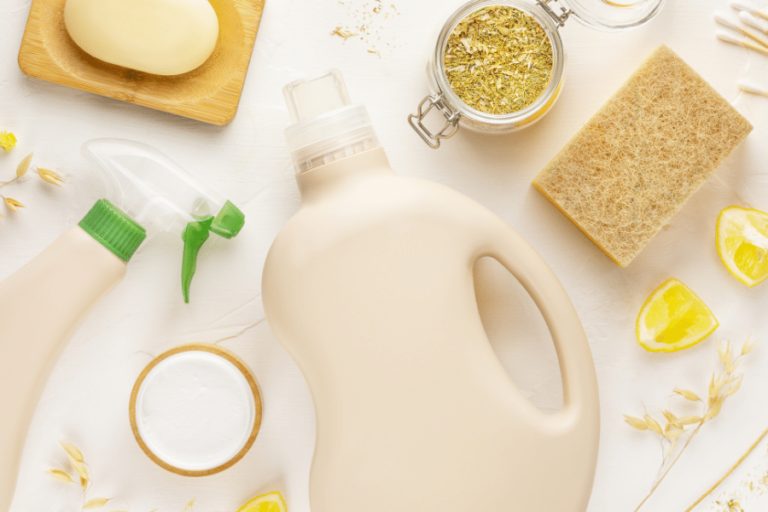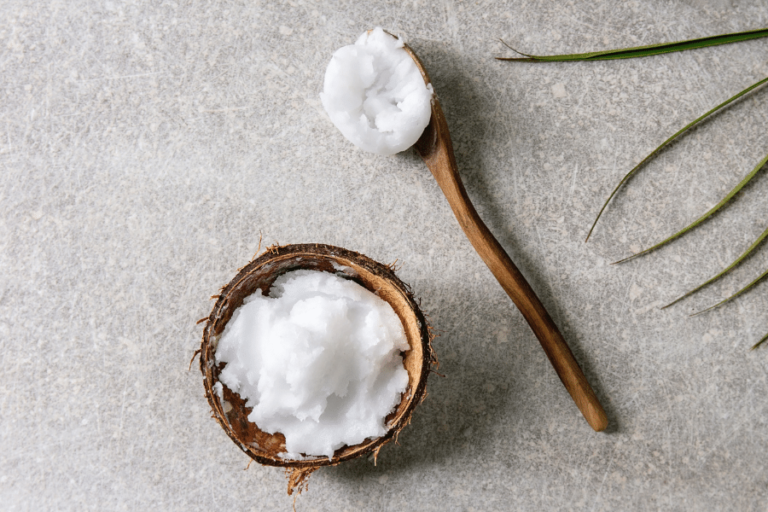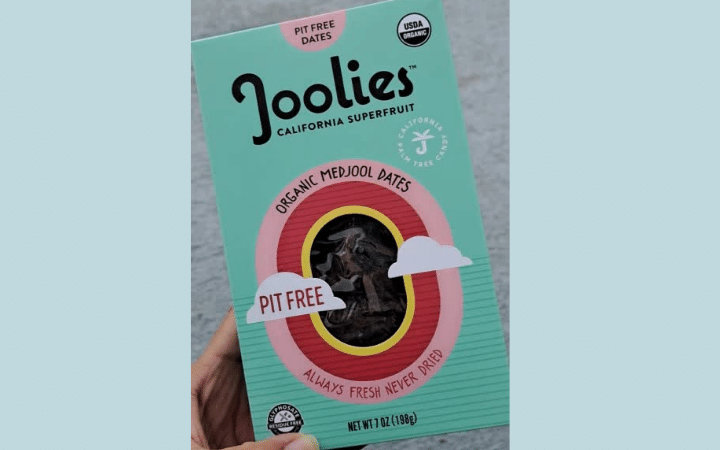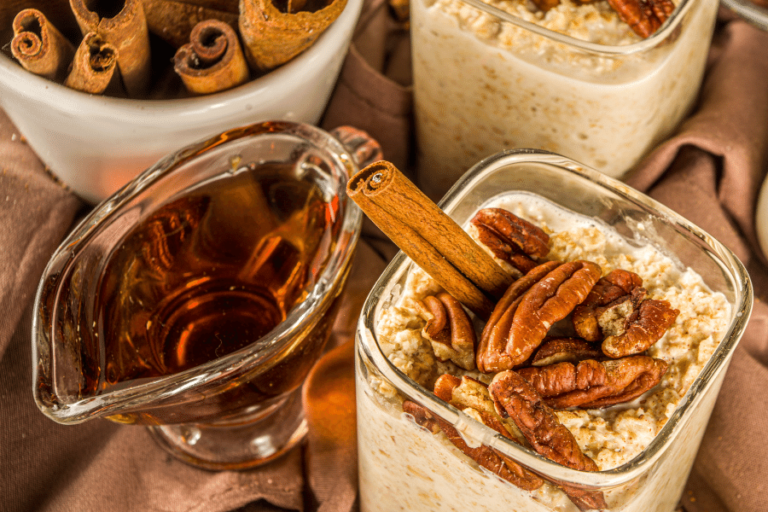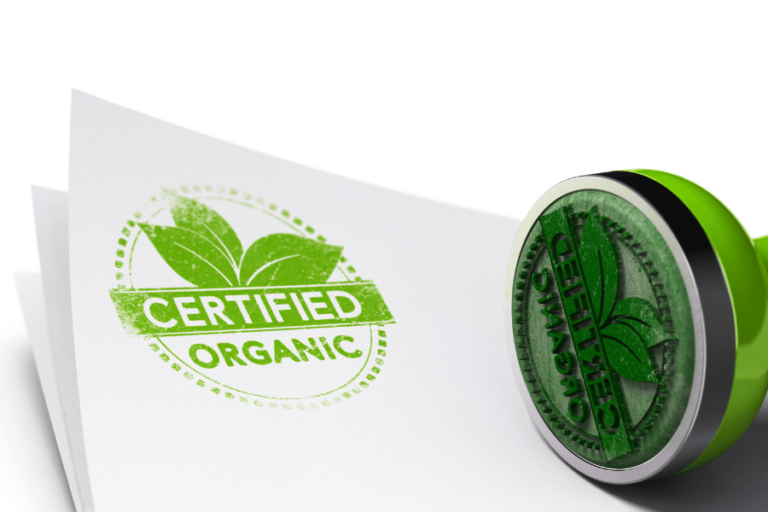Is Ghee Healthy?
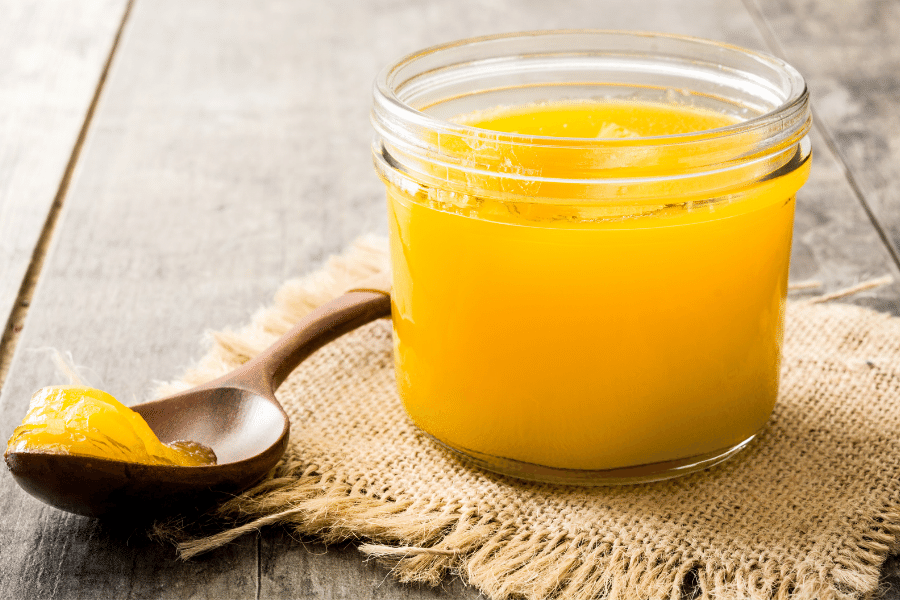
Ghee is said to be delicious and healthy food. Though I haven’t tried it (yet), I’m familiar with its excellent health benefits. But understanding what ghee is can also be confusing. It was for me when I first learned about it. With that said, let’s break down what ghee is, how it’s made, and the many potential health benefits of this beloved cooking oil.
What is Ghee?
Ghee is a type of clarified butter, a product made by heating butter to high temperatures and removing the water, milk solids, and proteins left behind in the process. This makes ghee more stable than regular butter because it has no water content. Ghee has a longer shelf life than regular butter because it contains no proteins or lactose (the sugar in milk). Proteins or lactose cause it to go bad quickly if left out on your countertop, as other dairy products do.
Ghee is used extensively in Indian cooking, where it’s traditionally used as an ingredient for dishes like tandoori chicken or naan breads.
Ghee Nutrition Facts
Ghee is made from butter. I’m sure you know butter is made from milk. It’s no surprise that ghee contains a lot of the same nutrients as butter—it starts out with all of them. Ghee has a higher smoke point than regular butter, which means it can be heated to higher temperatures without burning or losing its nutrients.
Ghee is used in Indian cooking and Ayurvedic medicine; it’s also known for its beneficial effects on digestion. One study found that people whose diets included ghee were less likely to suffer from diabetes than those who didn’t consume much ghee (though this might have had more to do with their overall diet than the fact that they ate ghee). Ghee contains vitamin K2 (MK-7), an essential nutrient that’s been linked to preventing heart disease and building strong bones.
Nutritional benefits of ghee
Ghee is high in saturated fat, but it’s a good source of vitamins A, K, and E. Ghee also contains minerals like calcium, iron, zinc, and magnesium.
Another benefit of ghee is its high in CLA (conjugated linoleic acid). CLA has been shown to help prevent cancer as well as reduce body fat by increasing metabolism.
But perhaps the most important thing about ghee is its short-chain fatty acids. These include butyric acid—which helps with digestion and metabolism—and caproic acid—which has anti-inflammatory properties that can help reduce pain or swelling caused by injury or disease.
Related Content
Benefits Of Honey With Oatmeal & Cinnamon
Is Extra Virgin Olive Oil Good For You?
Eat This Candy To Get Healthy
Ghee and Weight Loss
Ghee is packed with medium-chain fatty acids. A study in the journal Lipids found that these particular fats may help with weight loss and lead to leaner body mass. The researchers noted that ghee’s ability to stabilize blood sugar levels may be partly responsible for this effect since fluctuations in blood sugar are thought to play a role in hunger and cravings.
Another study conducted by researchers at the University of Connecticut found that people who ate high-fat snacks along with ghee burned more calories than those who didn’t eat any ghee at all—an indication that it may aid in weight loss.
In addition to its beneficial effects on metabolism, some studies have shown that regular consumption of medium-chain triglycerides (MCTs) can boost energy levels as well as reduce appetite and cravings for carbohydrates like breads and pasta.
How Is Ghee Made?
To understand how ghee is made, it’s essential to know what butter is. Butter is a dairy product that consists of 80% milk fat and 20% water. The churning process separates the fat from its milky liquid, leaving behind a solid block of butter. Ghee is simply regular butter that has been further split into two components: fat and water.
To make ghee, you begin by heating a block of butter until all its water evaporates completely. Depending on your method, this can take anywhere from one hour to three hours. Then, discard the remaining solids (the “milk solids” we mentioned earlier). This leaves you with 100% pure clarified butterfat. It can be used for cooking or as an ingredient in baked goods. Use it for baking cookies or cakes because it doesn’t burn at high temperatures like regular butter (since there’s no moisture left).
Clinical Evidence of Benefits of Ghee
In India, ghee has been used for centuries as a medicine. Ghee has been used to treat many health conditions, including skin and digestive problems. In fact, ghee is well known to have anti-inflammatory properties that can help reduce inflammation in the body. Many studies have shown that ghee can be beneficial in reducing heart disease risk factors like high cholesterol levels and blood pressure.
Research has also shown that ghee can improve metabolic syndrome (a cluster of symptoms including high blood sugar levels) by lowering bad cholesterol and triglycerides while increasing good cholesterol. It’s also been found to have anti-cancer properties because it contains butyric acid, which reduces oxidative stress caused by free radicals.
People with mental illnesses such as depression or anxiety may benefit from consuming more foods containing vitamin B6 (a nutrient found in dairy products) since this vitamin is needed for producing serotonin in the brain.
Does ghee have any side effects?
Ghee does have side effects. Although it is saturated fat, ghee has no trans fats and can be used in place of butter or other cooking oils. It also contains many health benefits like antioxidants, vitamins A, B6, and E (which help reduce inflammation), calcium, and iron. However, just like any other food item you consume regularly, too much of it can also cause side effects.
Ghee has high calories, which means it should be consumed in moderation. It’s best not to go overboard with it. Try not to consume more than your daily requirement of 2000-2400 calories per day, depending on your age and gender (source: U.S Food & Drug Administration). Additionally, suppose you are trying to lose weight. In that case, ghee should not be included in your diet plan because it will worsen things. It will increase the number of calories from fat rather than decreasing them as intended.
Gheel has many potential health benefits.
Ghee has potential health benefits. It’s a healthy fat, so you should eat more, not less.
But why is ghee so good for you? For one thing, it’s easier to digest than other types of butter and oils, which means that your body will absorb the nutrients from the food you eat faster and more efficiently.
It also contains butyric acid (also found in breast milk), which helps keep your gut healthy by preventing harmful bacteria from growing inside it. This can help with weight loss because it reduces inflammation in the gut caused by harmful bacteria or parasites!
Finally, ghee contains conjugated linoleic acid (CLA), which has been shown to reduce cancer risk and improve insulin sensitivity, among other things!
Conclusion
Ghee is a traditional food that has long been used in India and other Asian countries. It’s also popular in the West and has gained fame as a superfood. This is because of its high nutritional value and unique nutritional composition, which makes it incredibly beneficial to your health. If you want to boost your diet with some ghee, make sure you buy quality butter from grass-fed cows!
Do you love to use ghee and have you noticed any benefits to your health from using it? Please share in the comments below!
Resources
https://www.ncbi.nlm.nih.gov/pmc/articles/PMC2846864/
https://pubmed.ncbi.nlm.nih.gov/16440602/
https://pubmed.ncbi.nlm.nih.gov/15941017/
https://pubmed.ncbi.nlm.nih.gov/15159244/
https://www.ncbi.nlm.nih.gov/pmc/articles/PMC1728045/
https://pubmed.ncbi.nlm.nih.gov/10584044/
https://pubmed.ncbi.nlm.nih.gov/12540415/
https://pubmed.ncbi.nlm.nih.gov/25636220/
https://www.ncbi.nlm.nih.gov/pmc/articles/PMC4923077/
https://www.ncbi.nlm.nih.gov/pmc/articles/PMC4027827/
https://www.ncbi.nlm.nih.gov/pmc/articles/PMC3492709/
https://draxe.com/health/lose-weight-fast/
https://pubmed.ncbi.nlm.nih.gov/10483900/
https://pubmed.ncbi.nlm.nih.gov/17490954/
https://pubmed.ncbi.nlm.nih.gov/2887943/
https://pubmed.ncbi.nlm.nih.gov/14631863/
https://pubmed.ncbi.nlm.nih.gov/24078708/
http://nutritiondata.self.com/facts/dairy-and-egg-products/2/2
https://draxe.com/nutrition/vitamin-a/
https://draxe.com/health/ayurvedic-medicine/
https://draxe.com/health/coronary-heart-disease/
https://draxe.com/nutrition/vitamin-k-foods/
https://draxe.com/nutrition/calcium-deficiency/
https://draxe.com/nutrition/healthy-fats/
https://draxe.com/health/natural-constipation-relief-remedies/
https://draxe.com/health/natural-constipation-relief-remedies/
https://draxe.com/health/arthritis-diet/
https://draxe.com/nutrition/conjugated-linoleic-acid/

